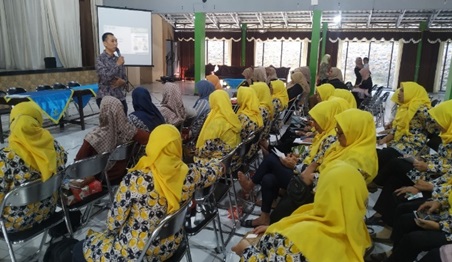Pencegahan Stunting pada Balita melalui Upaya Penerapan Enam Prinsip Higiene Sanitasi Pangan Rumah Tangga Prevention Stunting for Child Under Five Years Old through Implementation Efforts of Six Principles of Food Higiene Sanitatin on Household
Main Article Content
Abstract
Consuming food contaminated with physical, chemical, and bacteriological substances can cause diarrhea and worms, which results in children under five years old experiencing lacking nutrition and growth disorders, putting them at risk of stunting. The six principles of food sanitation hygiene aim to reduce the risk of disease transmission and health problems from consuming food. These community empowerment activities aim to increase the knowledge of health cadres in preventing stunting for children under five years old through implementation efforts of six principles of food hygiene sanitation in households. The target of this activity was 47 health cadres. Activity stages include coordination, preparation of pocketbooks, training, and evaluation. Statistical analysis was conducted for differences in health cadres' knowledge levels before and after training using the dependent t-test. The results of the coordination show that there is support and participation from 3 built villages, including Pandak, Karangmangu, and Kemutug Kidul villages. Arranged a pocketbook on stunting prevention and six principles of food sanitation hygiene as a reference for health cadres for outreach to the community. The training showed increased health cadres' knowledge before and after the activity (p-value=0.001). The results of community empowerment can be used as input for policymakers at the Baturraden II Primary Health Center and the District Health Officer Banyumas to accelerate stunting reduction through counseling on six principle hygiene sanitation implementation in households in sustainable.
Downloads
Article Details

This work is licensed under a Creative Commons Attribution-ShareAlike 4.0 International License.
Authors who publish with this journal agree to the following terms:
- Any article on the copyright is retained by the author(s).
- Author grant the journal, right of first publication with the work simultaneously licensed under a Creative Commons Attribution License that allows others to share work with acknowledgment of the work authors and initial publications in this journal.
- Authors are able to enter into a separate, additional contractual arrangements for non-exclusive distribution of published articles of work (eg, post-institutional repository) or publish it in a book, with acknowledgment of its initial publication in this journal.
- Authors are permitted and encouraged to post their work online (e.g., in institutional repositories or on their websites) prior to and during the submission process, as can lead to productive exchanges, as well as earlier and greater citation of published work.
- The article and any associated published material is distributed under the Creative Commons Attribution-ShareAlike 4.0 International License
References
Angelina, R., Fauziah, L., Sinaga, A., Sianipar, I. and Musa, E. (2020). Peningkatan Kinerja Kader Kesehatan melalui Pelatihan Kader Posyandu di Desa Babakan Kecamatan Ciparay 2019. JPKMI (Jurnal Pengabdian Kepada Masyarakat Indonesia), 1(2) pp. 68–76. https://doi.org/10.33860/mce.v1i1.652
Darundiati, Y.H. (2017), Buku Ajar Dasar Kesehatan Lingkungan, 1st ed. Semarang : FKM UNDIP PRESS.
Dinkes Kab. Banyumas. (2022), Laporan Survey Pemantauan Status Gizi Yang Dilakukan Dinkes Banyumas Tahun 2021. Purwokerto.
Hidayani, W.R. (2020). Riwayat Penyakit Infeksi yang berhubungan dengan Stunting di Indonesia : Literature Review.Jurnal Seminar Nasional, 2(1)pp. 1–8. https://doi.org/10.48186/.v2i01.264.45-53
Kemenkes RI. (2011), “Peraturan Menteri Kesehatan RI No 1096/ Menkes / PER/ VI/ 2011”, Higiene Sanitasi Jasaboga. Jakarta
Kemenkes RI. (2014), “Permenkes RI No. 3 Tentang Sanitasi Total Berbasis Masyaralat”. Jakarta
Lagiono, L., Nuryanto, N., Rudijanto, H., Maulana, M.R. and Ma’ruf, F. (2023). Evaluasi Layanan Layanan Kesehatan Lingkungan Sebagai Intervensi Spesifik Untuk Mendukung Akselerasi Penurunan Stunting. LINK 19(1) pp. 34–42. https://doi.org/10.31983/link.v19i1.9428
Nuryanto and Lagiono. (2023). Analisis Pemodelan Capaian Sarana Sanitasi Dasar Rumah dengan Kejadian Stunting pada Balita. Buletin Keslingmas : Buletin Kesehatan Lingkungan Masyarakat. 42(3) pp. 147–152. https://doi.org/10.31983/keslingmas.v42i3.10497
Purwanti, R. (2019). Peningkatan Kapasitas Kader Posyandu: Cegah Stunting dengan Perbaikan Gizi 1000 Hpk”. ETHOS (Jurnal Penelitian Dan Pengabdian). 7(2)pp. 182–189. https://doi.org/10.29313/ethos.v7i2.443
Rahmawati, A. (2020). Education Method of Lectures and Discussionstoward Health Cadre Ability in Early Detection of Dengue Hemorrhagic Fever. Jurnal Ilmiah Pamenang, 2(1) pp. 50–55. https://doi.org/10.53599/jip.v2i1.63
Rosmiati, Muhdar, TTulak, G., Saputri, E. and Susanti, R.W. (2020). Pengaruh Penyuluhan Kesehatan Tentang Stunting Untuk Meningkatkan Pengetahuan Pasangan Usia Subur, Ibu Hamil, dan Ibu Balita di Wilayah Kerja Puskesmas Polinggona. Jurnal Endurance : Kajian Ilmiah Problema Kesehatan. 1(12), 50–69.
Siswati, T., Iskandar, S., Pramestuti, N., Raharjo, J., Rialihanto, M.P., Rubaya, A.K. and Wiratama, B.S. (2022), “Effect of a Short Course on Improving the Cadres’ Knowledge in the Context of Reducing Stunting through Home Visits in Yogyakarta, Indonesia”. International Journal of Environmental Research and Public Health,. 19(16), pp. 1–10. https://www.preprints.org/manuscript/202206.0351/v1#:~:text=10.20944/preprints202206.0351.v1
WHO. (2021), “a Guide To World Food Safety Day”, WHO available at: https://cdn.who.int/media/docs/default-source/campaigns-and-initiatives/world-food-safety-day-2021/guide-to-world-food-safety-day-2021-en.pdf?sfvrsn=79643104_30&download= true (accessed 23 April 2022)
WHO. (2022a), “World Food Safety Day 2022 - Safer food, better health”, available at: https://www.who.int/news/item/07-06-2022-world-food-safety-day-2022-safer-food-better-health (accessed 11 June 2022).
WHO. (2022b), “Global nutrition targets 2025: stunting policy brief”, WHO, available at: https://www.who.int/publications/i/item/WHO-NMH-NHD-14.3 (accessed 23 April 2022).
